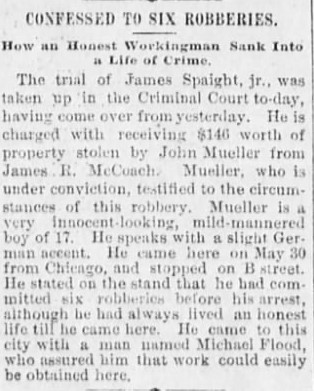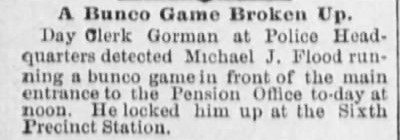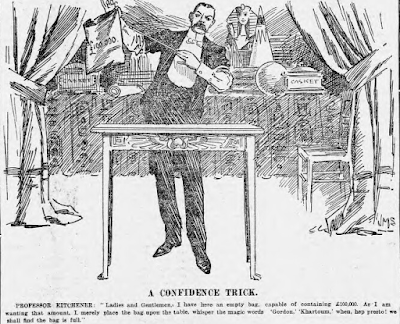Michael J. Flood was born about 1867 in District of Columbia.
Here are some newspaper articles on his crime for the above:
In 1878 he was assaulted in District of Columbia by William Coleman.
The thimble game id the same concept as the shell game. When a wager for money is made, it is almost always a confidence trick used to perpetrate fraud.
1888 he was doing the Bunco Game in District of Columbia.
He knew where to set it p as people were getting their money. Bunco Game is a swindle in which you cheat at gambling or persuade a person to buy worthless property. Played with dice.
A confidence trick is an attempt to defraud a person or group after first gaining their trust. Confidence tricks exploit victims using their credulity, naïveté, compassion, vanity, irresponsibility, and greed. Researchers have defined confidence tricks as "a distinctive species of fraudulent conduct ... intending to further voluntary exchanges that are not mutually beneficial", as they "benefit con operators ('con men') at the expense of their victims (the 'marks')".
In Confessions of a Confidence Man, Edward H. Smith lists the "six definite steps or stages of growth" of a confidence game.[7] He notes that some steps may be omitted.
Foundation work
Preparations are made in advance of the game, including the hiring of any assistants required and studying the background knowledge needed for the role.
Approach
The victim is approached or contacted.
Build-up
The victim is given an opportunity to profit from participating in a scheme. The victim's greed is encouraged, such that their rational judgment of the situation might be impaired.
Pay-off or convincer
The victim receives a small payout as a demonstration of the scheme's purported effectiveness. This may be a real amount of money or faked in some way. In a gambling con, the victim is allowed to win several small bets. In a stock market con, the victim is given fake dividends.
The "hurrah"
A sudden manufactured crisis or change of events forces the victim to act or make a decision immediately. This is the point at which the con succeeds or fails. With a financial scam, the con artist may tell the victim that the "window of opportunity" to make a large investment in the scheme is about to suddenly close forever.
The in-and-in
A conspirator (in on the con, but assumes the role of an interested bystander) puts an amount of money into the same scheme as the victim, to add an appearance of legitimacy. This can reassure the victim, and give the con man greater control when the deal has been completed.
In addition, some games require a "corroboration" step, particularly those involving a fake, but purportedly "rare item" of "great value". This usually includes the use of an accomplice who plays the part of an uninvolved (initially skeptical) third party, who later confirms the claims made by the con man.
This line of fraud must not of work out well for him and perhaps why he started robbing people in other ways.
He was charged with larceny, then it went for appeal in 1888
1889 he was back at coning again with the Flim Flame Game.
In addition to general deceiving or tricking, the verb flimflam is often used specifically to refer to swindling someone out of money. The ultimate origin of flimflam is uncertain, but the word is probably of Scandinavian origin and may be related to the Old Norse flim, meaning "mockery."
I did not find any of his family, he may of lied about his birthplace and might have been born in New York or some other close area to D.C. I would bet his father was most likely Irish.

















Comments
Post a Comment